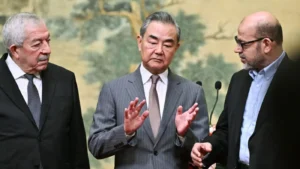Palestinian factions strike a reconciliation deal – will this time be any different?

L-R, Fatah’s Mahmoud al-Aloul, Chinese Foreign Minister Wang Yi and Hamas’s Mousa Abu Marzouk in Beijing on 23 July 2024
Qassam Muaddi writes in Mondoweiss on 26 July 2024:
The signing of a new reconciliation deal between rival Palestinian factions in China on Tuesday was received by Palestinians both as a surprise and as unremarkable. It was not the first time that Palestinian leaders had signed an agreement committing to national unity – agreements that have previously and routinely failed to end the political divisions between the parties. But the new agreement signed in China also came completely unannounced, after recent attempts to breach the gaps between the factions during the current war, failed miserably. Is it possible the new agreement reflected a breakthrough?
The main point in the new agreement is the commitment by all factions to form a “national consensus government,” which would be in charge of running affairs in Gaza after the war. The agreement affirmed that the government would be chosen in consensus by all factions, which indicates that it would not be formed of representatives of the factions but rather by technocrats, upon whom all the factions agree.
The agreement also states that the final goal of the reconciliation process is a “full national unity within the framework of the PLO.” This means that both Hamas and the Palestinian Islamic Jihad, and other factions that emerged during the first and second Intifadas would have to join the PLO, which raises the central question of the PLO’s political program; mainly the commitment to a negotiations process as a way to establishing a Palestinian state, while cooperating in security and business affairs with Israel.
These tensions already exist within the PLO. Some important member factions within the PLO, like the PFLP, fundamentally reject this program, and with the lack of regular elections and deliberations, these disagreements have made the PLO non-functional. With more factions who oppose the official PLO program joining the PLO, this problem would only increase, and the “full unity” would be little more than a formal one.
